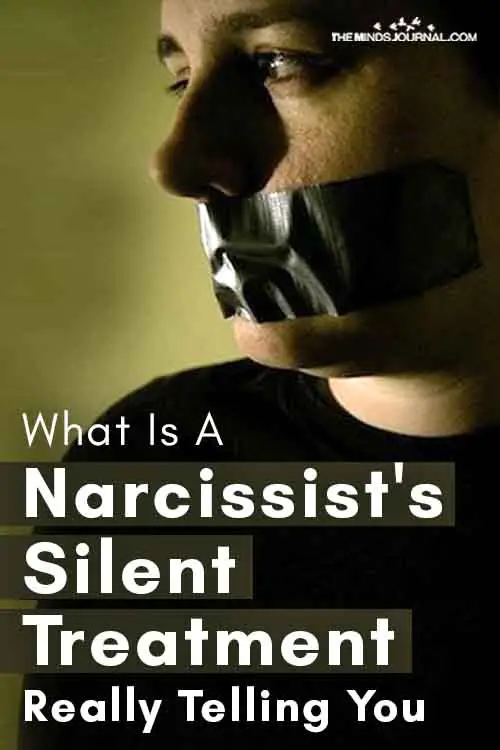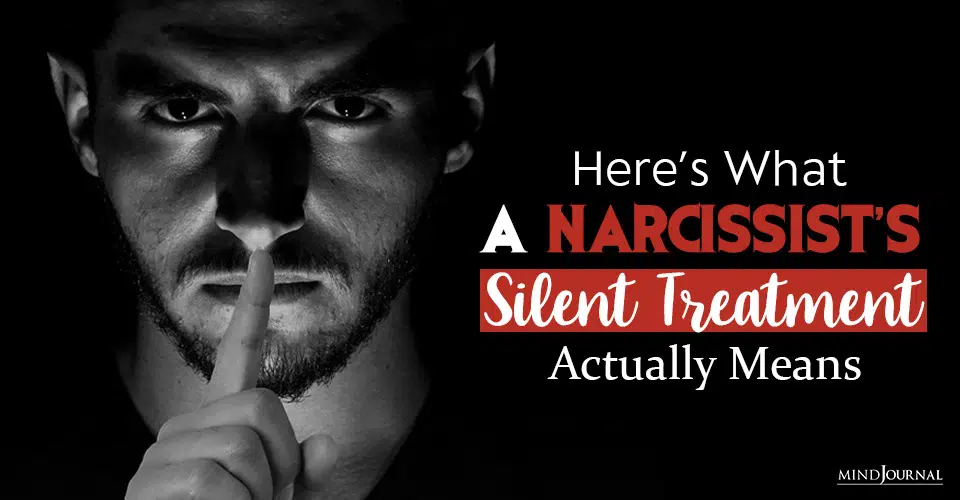The Silent Treatment. One of our most potent methods of manipulation. Whether it is a present silent treatment where we talk to everyone else around you but not you or whether it is an absent silent treatment where we disappear and cannot be found or contacted, we know that this is highly effective.
It does not matter if the silence lasts for ten minutes or ten days the impact on you is considerable and your reaction is always the same. That is, of course, the main reason that we do it.
You will repeatedly ask us what is wrong as you fail to understand what it is that we are doing. You will hang around us, if that is possible, asking the same questions over and over again.
“What is wrong, please tell me?”
“What is the matter, I wish you would tell me?”
“What is it? Why aren’t you speaking to me?”
Related: The Covert Narcissist: Angel On The Outside, Devil On The Inside
Your concern related to silent treatment mutates into frustration and anxiety and even occasionally anger. All of these states suit us as we drink the fuel you are providing to us. If we absented ourselves then we will face a slew of text messages, e-mails, and voicemail messages as you keep ringing every five minutes trying to establish contact with us.
After a time the nature of the questioning changes as you shift from asking us what is wrong to hauling yourself over the coals. It is all so predictable.
You ask yourself what is it that you could have done which has caused us such offense that we are no longer speaking to you. You analyze everything you have said and done over the last hour, the last five hours, the last day.
Did you insult us in some way and not realize it? Surely it was not that comment about our tie, that was a joke. Was that the catalyst for this silence? Did you fail to kiss us on our arrival home?
You cannot remember but these days you often find that is the case since the days all seem to merge into one as you pad around trying not to tread on those eggshells. If only the tiredness would lift.
Related: How to Emotionally Hurt A Narcissist, The Way They Hurt You
You might be able to think straight then and be able to ascertain what is going on. You keep providing us with different suggestions and scenarios as to what has happened. You grope around, utterly unsure as to what it was that proved to be the trigger.
You issue apologies and it gets to the point that you do not even know what you are apologizing for but that does not matter does it? All you want is for this horrible silence, the aching absence to end.
It has happened before and then it ended as arbitrarily as it arrived. You cling on to the hope that it will end as it did last time but then there is that gnawing doubt which keeps manifesting in your mind.
What if it won’t end? What if this is it and we have gone for good? Surely not and for what reason? The doubt is horrible and you feel a rising sense of panic which causes you to redouble your efforts to find us and offer yourself up in sacrifice in order to get us to come back.
Time after time we do silent treatment to our victims but they do not realize what our silence really means. They are trapped by fear, paralyzed by indecision and this is naturally how we like it. This confusion and inability to really see what is going on serves our purpose.
What is our silent treatment really telling you?
It is telling you how we enjoy to play fast and loose with your feelings.
It is telling you that we do not care about you. You mean nothing to us other than the fuel you provide.
We are reminding you of how inferior you are to us. You are nothing more than an appliance that we can switch on and off, pick up and put down at our convenience.
We are trumpeting our lack of respect for you and your identity.
We are heralding our flagrant disregard for your well-being.
We are telegraphing our disdain for our supposed responsibilities.
We are reinforcing that you do not matter.
Related: The Silent Treatment Vs. No Contact: What’s The Difference?
Instead, you seek to eradicate the silence, you plan and arrange to do anything which you hope will dispel the absence of communication. Too caught up in trying to remove the unpleasant sensations that wrap around you, you fail to see the clear message that we convey to you each time we behave in this manner.
We are behaving as we did when we were told we could not have another biscuit and we sat sulking until our worn-down parent gave in.
Most people grow out of such conduct but not us. We saw the power silent treatment would wield over certain people (others, of course, would never countenance it and we knew never to show it to them or suffer the consequences) but everyone else would flock around us, flapping and attending to us and we realized just how we could wrap people around our little fingers so they gave us what we wanted.
It was not the extra lollipop or permission to play out for an extra hour. It was attention and attention laced with emotion. Fuel. We may not have realized it then but we took this childish response and turned it into a weapon that causes you fear and frustration every time we unleash it. If only you could understand what we are really doing, then you would understand just how much we are truly telling you by saying absolutely nothing.
Have you ever experienced such silent treatment from your partner? Let me know your thoughts in the comments.
Written by HG Tudor Originally appeared on Narcsite










Leave a Reply
You must be logged in to post a comment.